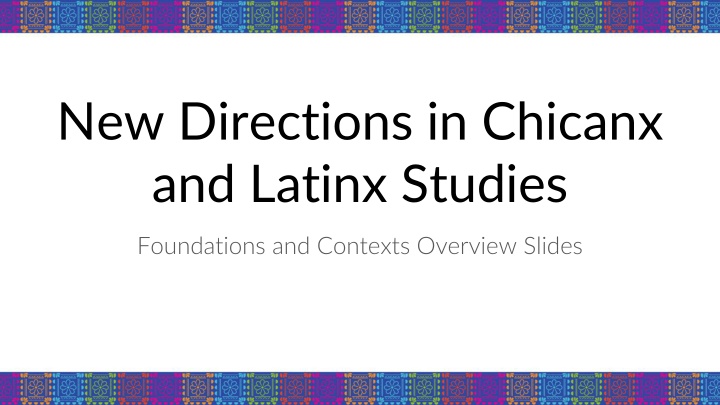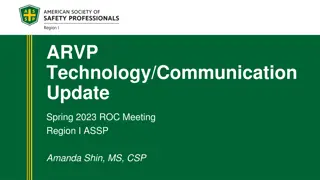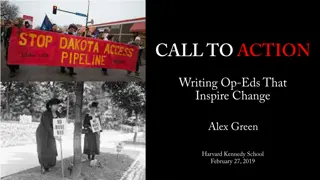
Discovering New Horizons in Chicanx and Latinx Studies
Explore the foundations and contexts of Chicanx and Latinx studies, including core concepts, student learning outcomes, and historical timelines. Delve into the cultural significance and impact of Chicanx and Latinx communities, emphasizing identity, social movements, and collective self-determination.
Download Presentation

Please find below an Image/Link to download the presentation.
The content on the website is provided AS IS for your information and personal use only. It may not be sold, licensed, or shared on other websites without obtaining consent from the author. If you encounter any issues during the download, it is possible that the publisher has removed the file from their server.
You are allowed to download the files provided on this website for personal or commercial use, subject to the condition that they are used lawfully. All files are the property of their respective owners.
The content on the website is provided AS IS for your information and personal use only. It may not be sold, licensed, or shared on other websites without obtaining consent from the author.
E N D
Presentation Transcript
New Directions in Chicanx and Latinx Studies Foundations and Contexts Overview Slides
Student Learning Outcomes 1. Analyze and articulate core concepts related to identity in Chicanx and Latinx studies and the core frameworks of the textbook, including transnational, intersectional, and relational perspectives. 2. Apply knowledge produced by Chicanx and Latinx communities about the origins, critical events, and cultural context of the field, with a particular emphasis on agency, social movements, and collective self-determination. 3. Review a foundational overview of the textbook, including its organization, sections, and content. Image Attribution: Coyolx uhqui (CC BY-SA 3.0) SJB1995 via Fandom
Quien no sabe de donde viene no sabe hacia d nde va (someone who doesn t know where they came from doesn t know where they are going) dicho
Core Concepts in Chicanx and Latinx Studies What is Chicanx and Latinx studies all about? Like the discipline of ethnic studies, Chicanx and Latinx studies is about representing self identity, stories of community, systems of oppression, social movements, and solidarity, with the goal of improving conditions for Chicanx and Latinx communities and creating greater opportunities for leadership and self-determination. Chicanx and Latinx studies teaches that some of our familial and community hxstories have been shaped by four major historical eras including: 1. Indigenous or pre-colonial 2. European colonialism 3. cultural nationalisms, and 4. contemporary era.
Chicanx and Latinx Studies Historical Timeline 1962 1966 1968 1969 United Farm Workers founded Black Panther Party founded by Merritt College students San Francisco State College strike for Ethnic studies begins San Francisco State College founds College of Ethnic Studies 1962 1964 1966 1968 1969 Merritt College students advocate for Black Studies East LA Walkouts CSULA establishes Mexican American studies Plan Espiritual de Aztl n Plan de Santa B rbara 1964 1968 1968 1968 1968
Chicana: The feminine form of Chicana, Chicano, and Chicanx and refers to women and girls, and Chicano is the masculine form, which refers to men and boys. Key Terms (1/3) Hispanic: A term that became popularized and is assigned by the United States Census and other government offices to emphasize Spanish influence. Chicanx and Latinx studies: A discipline that has worked for over fifty years to provide a more accurate understanding of the political, cultural, historical, and social contexts that shape our current-day experiences of race, identity, community, and the disparities that plague our society. Xicana, Xicano, and Xicanx: Those whose families originate from the homeland of [Me]xicana/os and Indigenous people. Latina, Latino, and Latinx: People with ancestry connected to anywhere in Latin America. Latinx differs from Latina/o as the x renders the term gender-neutral and more inclusive. Open Educational Resources (OER): Instructional materials that are designed to be freely used, shared, and adapted. Chicana, Chicano, and Chicanx: Social and political identity terms chosen by people of Mexican heritage living in the United States to signify their Indigenous ancestry to the greater Southwestern and Mesoamerican (also called Anahuac) regions. This identity term emerged as a direct response to the term Mexican American to focus greater attention on the political, social, and cultural position of people of Mexican heritage. When the term ends in an x, it signifies a non-binary gender, either referring to all people regardless of gender or specifically referring to people of non-binary identities. Indigenous Latinx: Indigenous migrants from Latin America living in the United States who practice their Indigenous languages, ceremonies, medicines, foodways, and ancestral lands. Afro-Latinx: People of African and Latin American heritage, and corresponds to national or regional variations of the term, such as Afro-Mexican or Afro-Brazilian. Rehumanization: Conscious work done to combat systemic oppression so that people can participate in a civic society towards democracy in a multicultural society.
Settler-colonialism: Specific forms of colonialism in which outside powers attempt to eradicate and replace the living societies of Native people to establish and maintain settler societies. Key Terms (2/3) Colonial education: Settler institutions that have attempted erasure and genocide of Indigenous lifeways, including the government and Church-run Boarding Schools in the United States and Canada. Hxstories: The collective impact of past events, avoiding the andro-centric and colonial association with the term history. Cultural funds of knowledge and cultural wealth: Assets, information, wisdom, and expertise that exists within communities that have been neglected and disregarded by institutional systems of knowledge production. Third World Liberation Front (TWLF): A multi-ethnic coalition of students that were awoken to the fact that they were being taught in ways that were dominating and irrelevant to themselves (Maeda, 2012), and included a coalition of the Black Student Union (BSU), Latin American Student Organization (LASO), Intercollegiate Chinese for Social Action (ICSA), Mexican American Student Confederation, Philippine (now Pilipino) American Collegiate Endeavor (PACE), La Raza, Native American Students Union, and Asian American Political Alliance. Organic intellectuals: Individuals who gain advanced expertise through direct experience, working with community members directly, and engaging in hands-on work. Decolonization: The diverse struggles led by Indigenous people for sovereignty, self-determination, and a transformation of the ongoing conditions of colonial power. El Plan de Santa Barbara: A document that united diverse activists from around the state of California and laid out a roadmap for Chicana/Chicano studies, as well as programs to increase the retention, engagement, and success of students from minoritized backgrounds. Traditional knowledge: Forms of knowledge practiced by Indigenous groups provide both content expertise and communicate lifeways and intergenerational transfers of information and guided inquiry.
Intersectionality: A concept that emphasizes the importance of recognizing multiple identities when analyzing an individual or group s relationship to societal power structures and institutions. Key Terms (3/3) Transnational: Social dynamics that exist beyond an individual community and nation-state. This deconstructs the importance of existing nations, borders, and paradigms of citizenship and instead focuses on how culture, society, and human life communicates identity and moves across lands. Movimiento Estudiantil Chicanx de Aztl n (MEChA, formerly Movimiento Estudiantil Chicano de Aztl n): A national student organization with local chapters that advocate for equity and justice in higher education Relational approaches: Frameworks that utilize dynamic comparisons between groups to yield greater knowledge, encourage solidarity, and find creative solutions to systemic problems. General education graduation requirement: A type of course that all students are required to take as part of their educational requirements to earn a degree. In California, ethnic studies has become a general education graduation requirement in all public high schools and colleges. Critical Race Theory: A legal perspective put forward by scholars to identify the link between U.S. laws and the structure of racism, with the goal of better ending racial discrimination and disparities. This perspective has been misrepresented by conservative activists.






















